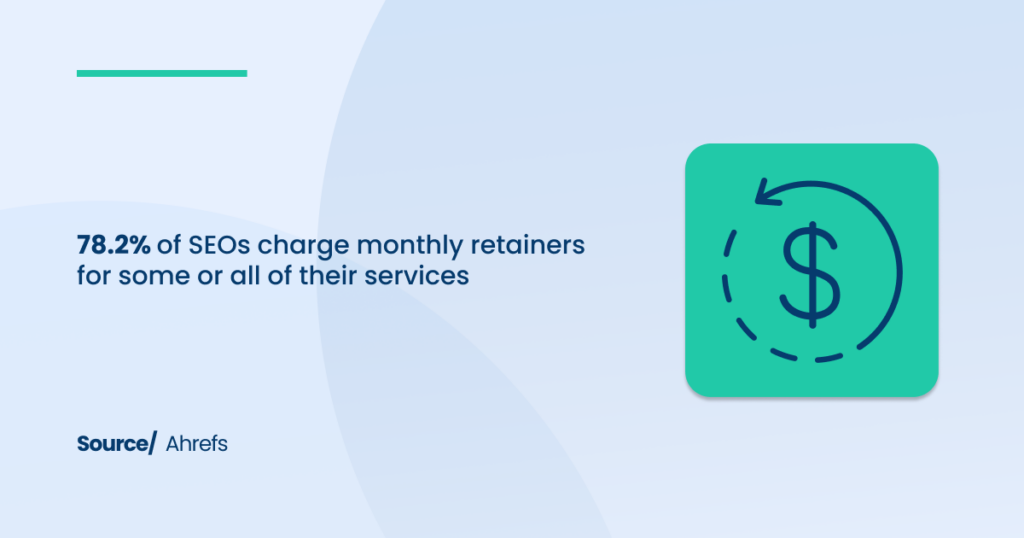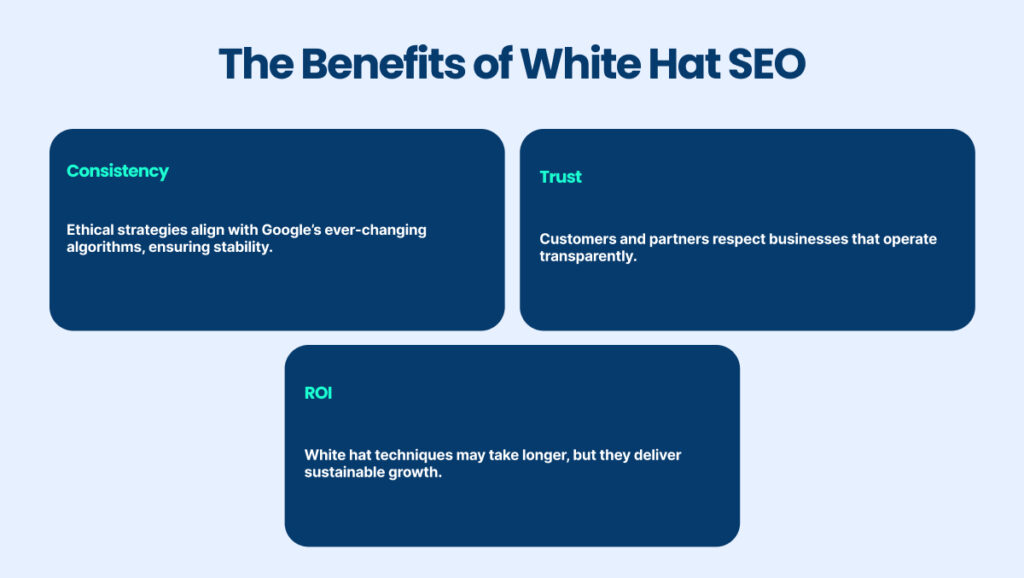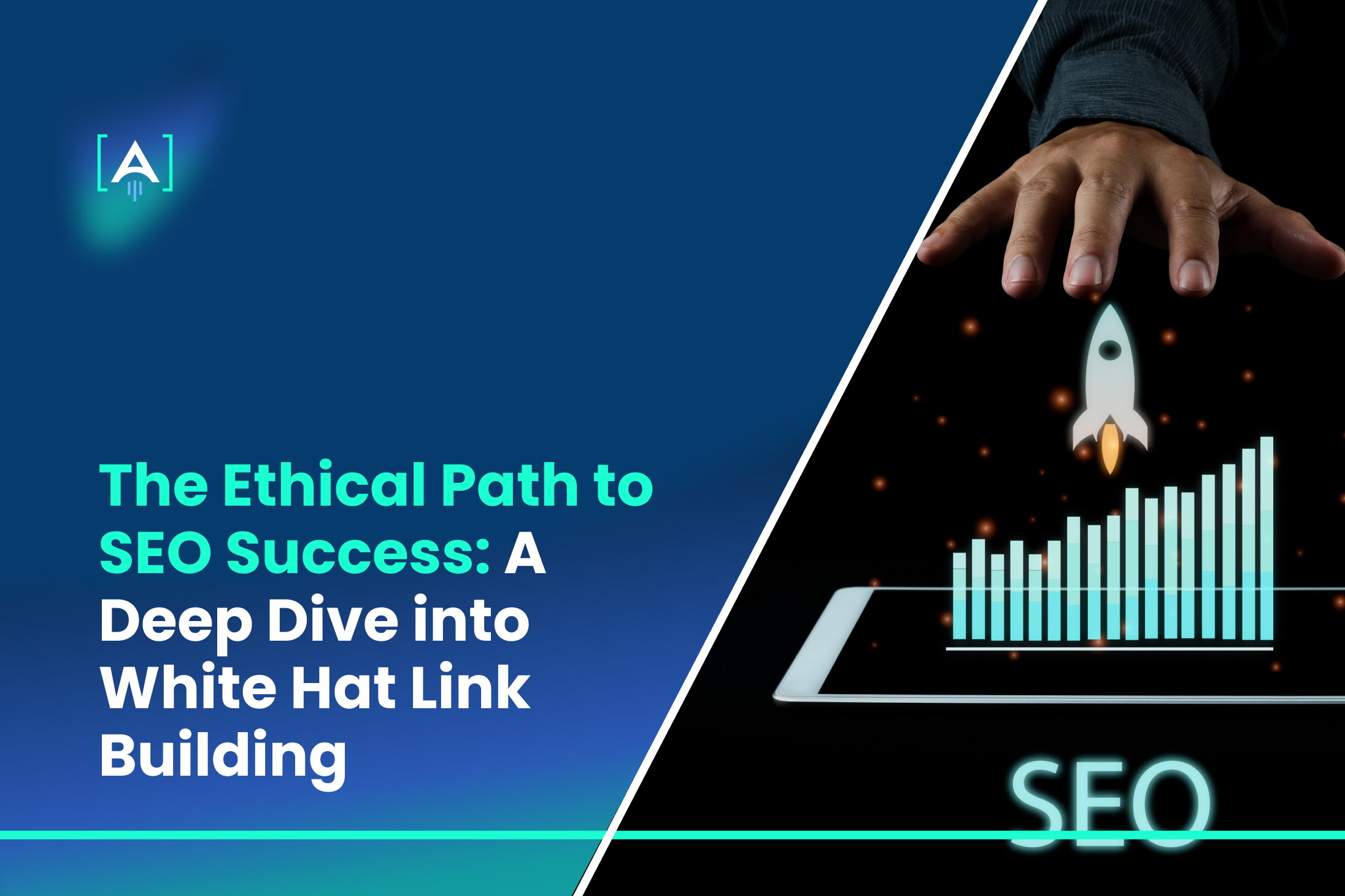By earning high-quality backlinks from reputable websites, you’re signaling to search engines that your content is valuable and trustworthy.

3 Essential Points for SEO
- High-Quality, User-Focused Content
- Technical SEO for Website Performance
- Earning and Building Quality Backlinks
Just like in real life, building relationships is key to success. In the digital world, those relationships are forged through backlinks. A professional Link Building Agency will develop a customized strategy for your business and leverage relationships for high-quality backlinks.
Join us as we explore the strategies that will help you climb the search engine rankings, the right way.
Why Should CEOs Care About White Hat SEO?
As a CEO, you’re focused on driving growth, building your brand, and staying ahead of the competition.
While SEO might feel like a technical detail best left to your marketing team, white hat SEO, especially white hat link building, is a cornerstone for achieving sustainable success in today’s digital-first world.
Ethical Practices Build Trust and Protect Your Brand
Think of SEO as the reputation management of the online world. Would you risk your brand’s credibility with questionable practices?
Unethical SEO strategies, such as buying backlinks or using manipulative tactics, might bring short-term results, but the consequences are severe. Google’s algorithm is smarter than ever, penalizing sites that break its guidelines. A penalty can drop your website’s rankings overnight, making it harder for potential customers to find you.
By focusing on white hat link building, your business stays on Google’s good side.
What is link building, after all, if not an opportunity to build meaningful connections with trusted websites?
Ethical practices ensure your website attracts genuine backlinks from authoritative sites, signaling to search engines that your content is valuable and reliable. This trust leads to higher rankings, more visibility, and a stronger brand reputation.
The Cost of Unethical SEO
Imagine spending months and a significant budget on growing your online presence, only to have it all undone by one Google penalty. A single penalty can cause:
- A 60%-90% drop in organic traffic, slashing your inbound leads and revenue.
- Loss of customer trust, as users associate your brand with shady practices.
- Increased costs for recovery, including hiring specialists and rebuilding your online authority.
White Hat vs. Black Hat: The Boardroom Perspective
As a CEO, your decisions directly influence the growth and reputation of your business.
SEO is no exception. While technical terms like white hat link building, what is link building, or how to get backlinks might feel distant from your daily priorities, the choice between white hat and black hat strategies is one of ethics, risk, and long-term success.
What’s the Real Cost of Cutting Corners?
Shortcuts in SEO don’t just cost money—they can cost you trust and visibility.
Black hat SEO techniques—such as buying backlinks, participating in link farms, or spamming irrelevant content—may seem like a quick fix, but they come with hidden dangers.
The Financial Risks
- Penalties Can Devastate Rankings: Google doesn’t tolerate unethical practices. Penalties can result in your site disappearing from search results altogether. A website on the second page of Google typically sees less than 1% of total traffic—a huge revenue loss.
- High Recovery Costs: Cleaning up after a penalty requires significant time and money. You’ll need SEO specialists, fresh content, and possibly even a rebrand.
- Missed Opportunities: While you’re recovering, your competitors using white hat link building strategies will attract the leads you’ve lost.
The Reputational Risks
- Eroded Trust: Customers are smart. If they associate your brand with shady practices, their loyalty may waver.
- Public Backlash: In today’s transparent world, unethical actions can quickly become public, damaging your reputation.
Case Studies: Success and Failure
- Thriving with White Hat SEO: Imagine a local café that invested in local link building, connecting with community blogs and directories. Over time, it became the top search result for “best coffee shop in [city],” driving both foot traffic and online orders.
- Failing with Black Hat SEO: A popular clothing brand bought thousands of backlinks, skyrocketing their rankings—until Google caught on. Overnight, their traffic dropped by 80%, and they had to spend months repairing their reputation.
The lesson? Quick wins are rarely worth the long-term risks.
How to Explain SEO Ethics to Your Stakeholders
As a CEO, you’re often the bridge between your technical teams and stakeholders who may not fully understand SEO.
It’s crucial to simplify complex concepts like white hat link building to gain buy-in for ethical strategies.
What Is Link Building?
Start by explaining that link building is like building relationships in the business world. “When other websites link to ours, it’s like they’re endorsing our brand. The more endorsements we have from trusted sources, the higher our credibility and visibility in search engines.”
Why Ethics Matter
Emphasize that SEO isn’t just about rankings—it’s about building trust with both customers and Google. Ethical practices, like broken link building or competitor backlink analysis, focus on creating value rather than exploiting loopholes.

Tips for Aligning Teams
- Use Clear Metrics: Encourage your marketing team to track measurable outcomes like organic traffic growth, domain authority, and conversion rates to showcase success.
- Invest in Tools: Support your team with link building tools like Ahrefs or Moz to streamline ethical practices. These tools help identify local link building opportunities or analyze competitors.
- Celebrate Small Wins: White hat SEO takes time. Recognize milestones like acquiring a high-quality backlink or improving search rankings to keep morale high.
Link Building Without Tricks: A CEO’s Guide to Building Authority
White hat link building stands as the ethical, effective way to establish your brand as an authority.
Forget about shortcuts or black hat techniques; this is about crafting relationships and creating content that naturally attracts links.
Relationship-Driven SEO: The Secret Sauce to Link Building
The most enduring way to build links isn’t through tricks—it’s through genuine relationships with industry leaders and influencers.
These connections don’t just benefit your link-building efforts; they position your brand as a respected voice in your field.
Why Relationships Matter in SEO
- Trust Translates to Authority: When respected websites link to yours, it’s like a vote of confidence. Google sees this as a sign that your content is credible and valuable.
- Shared Audiences: Partnerships often lead to shared exposure, helping you reach a wider, relevant audience.
- Longevity Over Trends: Unlike trendy hacks, relationships grow over time and continue to provide returns.
How to Build and Nurture Partnerships
- Identify Key Players in Your Industry:
- Use competitor backlink analysis tools like Ahrefs to see who’s linking to your rivals.
- Find thought leaders and content creators whose audiences align with your target market.
- Start with Value:
- Offer something meaningful before asking for anything in return. This could be co-authored content, sharing their work on social media, or inviting them to speak at a webinar.
- Communicate Consistently:
- Relationships need nurturing. Send updates, share insights, and keep the conversation alive.
- Collaborate Creatively:
- Explore co-branded skyscraper technique content, where both parties enhance a high-value resource to attract even more backlinks.
- Measure and Refine:
Building relationships isn’t just good for SEO—it’s good for business. When you align with trusted voices, you build credibility that no shortcut can buy.
Your Brand Is a Magnet: Attracting Links Organically
Why chase links when you can attract them? By positioning your brand as a source of unique value, you can turn your website into a magnet for high-quality backlinks.
Content is king—but only if it’s worth linking to.
Source: HubSpot
Creating Link-Worthy Content
- Be the Ultimate Resource:
- The skyscraper technique is about making the best content in your niche. If competitors have a guide, make yours more detailed, visually engaging, and insightful.
- Example: A basic blog about “what is link building” might explain the concept. Your version could include types of backlinks, local link building tips, and an interactive infographic.
- Tell Stories That Resonate:
- People don’t just share facts—they share stories. Highlight your brand values through case studies or customer success stories. Did your product help a business grow? Share the journey, not just the outcome.
- Show Your Expertise:
- Original research, white papers, or industry reports are link magnets. For example, create a report on “The ROI of White Hat SEO for CEOs,” packed with actionable insights and data.
- Focus on Visuals:
- Infographics, videos, and charts are 3x more likely to be shared than text alone. A visually rich piece on “how to get backlinks” could gain traction across multiple platforms.
Putting It All Together
Link building without tricks isn’t just possible—it’s the most sustainable way to grow your business online.
By focusing on relationship-driven SEO and making your brand a natural link magnet, you’ll not only improve your search rankings but also strengthen your reputation as a leader in your field.
Key Takeaways for CEOs:
- Building relationships with industry leaders isn’t just ethical; it’s effective.
- Content that reflects your brand’s unique values and insights attracts the best backlinks.
- Tools like Ahrefs, Moz, and SEMrush can help identify and track opportunities.
Remember, white hat link building isn’t about quick wins—it’s about building something that lasts. When your brand stands out for the right reasons, the links will follow.
Tools CEOs Can Trust for Ethical SEO Success
Navigating the SEO world can feel overwhelming, especially for busy CEOs who must balance strategy and execution.
The right tools make ethical SEO manageable, data-driven, and efficient.
How Data-Driven Tools Can Simplify Ethical SEO
Ethical SEO isn’t just about playing by the rules—it’s about making informed decisions that drive sustainable growth.
Tools like Ahrefs, SEMrush, and BuzzSumo act as your virtual consultants, providing actionable insights while ensuring compliance with Google’s guidelines.
Key Benefits of SEO Tools for CEOs
- Monitoring ROI:
- SEO can be an intangible investment at first glance. Tools like SEMrush allow you to track keyword rankings, organic traffic, and backlinks, tying these metrics to revenue growth.
- Example: If your team uses white hat link building strategies, SEMrush can measure how many high-authority backlinks you’ve gained and their impact on traffic.
- Identifying Opportunities:
- Ahrefs excels at competitor backlink analysis, helping you uncover where your rivals get their links. This allows you to replicate their strategies or find untapped opportunities.
- Use Ahrefs’ “Content Explorer” to see which topics are generating backlinks in your industry, so you can create even better resources.
- Ensuring Compliance:
- Ethical SEO requires constant vigilance. BuzzSumo not only identifies trending topics but also helps you spot questionable backlinks. Avoiding black hat practices like link farming is crucial for protecting your brand’s reputation.
- Local SEO Insights:
- If you’re focused on local link building, these tools can pinpoint directories, community forums, or small businesses linking to competitors. This is perfect for building localized strategies that resonate with your target audience.
AI in Link Building: The Good, The Bad, and The Ethical
The rise of AI in link building is transforming how businesses approach SEO.
Source: Mckinsey Research
From speeding up research to automating tedious tasks, AI has immense potential—but it’s not without risks.
The Good: How AI Enhances Ethical SEO
- Streamlined Research:
- AI tools like ChatGPT and Surfer SEO can generate outreach emails, suggest link-building opportunities, and analyze competitor strategies in seconds.
- Example: Use AI to analyze thousands of websites and identify which ones are most likely to link back to your white hat link building efforts.
- Automated Outreach:
- Tools like Pitchbox automate email campaigns for backlinks. With personalization features, AI ensures your outreach doesn’t feel robotic.
- Pro tip: Combine AI’s speed with a human touch. Tailor the tone and content to reflect your brand’s values.
- Time Savings:
- CEOs are busy, and AI eliminates repetitive tasks. It frees up your team to focus on crafting quality content—because ultimately, white hat link building relies on value.
The Bad: Risks of Misusing AI in Link Building
While AI can boost productivity, misusing it can lead to unethical practices:
- Automated Content Generation:
- AI-generated blogs stuffed with keywords can seem tempting, but search engines penalize low-quality, unoriginal content.
- Case in point: Google’s algorithms prioritize E-E-A-T (Experience, Expertise, Authoritativeness, Trustworthiness).
- Over-Personalization:
- Some AI tools create hyper-personalized messages that come across as insincere. Balance automation with authenticity to build trust with your audience.
The Long Game: Why Patience Wins in SEO
For CEOs, the allure of quick wins is always tempting, especially when it comes to SEO.
However, the reality of search engine optimization is that it thrives on consistency, strategy, and—above all—patience.
Source: Ahrefs
Investing in ethical, long-term SEO strategies like white hat link building ensures sustainable growth that aligns with your business goals. But what happens when the results don’t show up overnight?
How to Measure Progress When Results Take Time
SEO is not about instant gratification—it’s about building a foundation that pays dividends over time.
As a CEO, tracking the right Key Performance Indicators (KPIs) is essential to understand how your efforts contribute to business growth.
1. Organic Traffic: Your Indicator of Visibility
When people talk about SEO, they often mean driving organic traffic—visitors who find your website through unpaid search results. This metric is the heartbeat of your SEO efforts.
- Why It Matters: Organic traffic reflects how well your site ranks for keywords your target audience searches for. The more visibility you have, the higher the chances of attracting leads.
- What to Track:
- Growth in the number of sessions from organic sources over time.
- Percentage of traffic from targeted keywords, especially high-intent ones.
- Engagement metrics like time spent on the site or pages visited per session.
2. Domain Authority: The Long-Term Trust Factor
Domain Authority (DA) is a score that predicts how likely your website is to rank on search engines.
While it’s not a direct ranking factor for Google, it’s a strong indicator of your site’s credibility.
- Why It Matters: A higher DA often translates to better search rankings. Think of it as your website’s “credit score” for search engines.
- How to Improve It:
- White hat link building: Focus on earning high-quality backlinks from authoritative sites.
- Content quality: Publish in-depth, valuable resources like guides and case studies.
- Competitor backlink analysis: Identify where your competitors get their best links and replicate their strategies.
3. Referral Traffic: The Proof of Backlink Value
When done right, link building strategies don’t just improve rankings—they also drive referral traffic.
This is the traffic that comes directly from links placed on other websites.
- Why It Matters: Each high-quality backlink is essentially an endorsement of your site. It signals to search engines that your content is valuable while bringing actual visitors to your pages.
- How to Track:
- Use Google Analytics to see which referral sources drive the most traffic.
- Evaluate the engagement of this traffic (e.g., bounce rate, conversions).
Why Patience is a Strategic Advantage
Think of SEO as compounding interest. The gains might seem small at first, but over time, they snowball into something far greater.
Ethical practices like white hat link building may not deliver instant results, but they protect your brand, build trust, and set you up for lasting growth.
Remember: The CEOs who win in SEO aren’t the ones chasing quick fixes—they’re the ones playing the long game with smart, sustainable strategies.
Closing the Loop on Ethical SEO: Why the Long Road Pays Off
SEO is more than just algorithms and rankings—it’s about building trust, authority, and long-term value for your brand.
The ethical path to SEO success may seem like the slower route, but it’s the one that ensures sustainable growth and protects your brand’s reputation.
[A] Growth Agency will partner with you to craft a strategy rooted in these values. Our experienced team will focus on approaches that not only meet today’s search engine guidelines but anticipate tomorrow’s changes.
We design a Growth Roadmap that encompasses the vision, strategy, and tactics your business needs to grow. This roadmap isn’t just a plan. It’s a tailored approach to aligning SEO efforts with your broader business goals.
Remember, Excellence is our standard.

